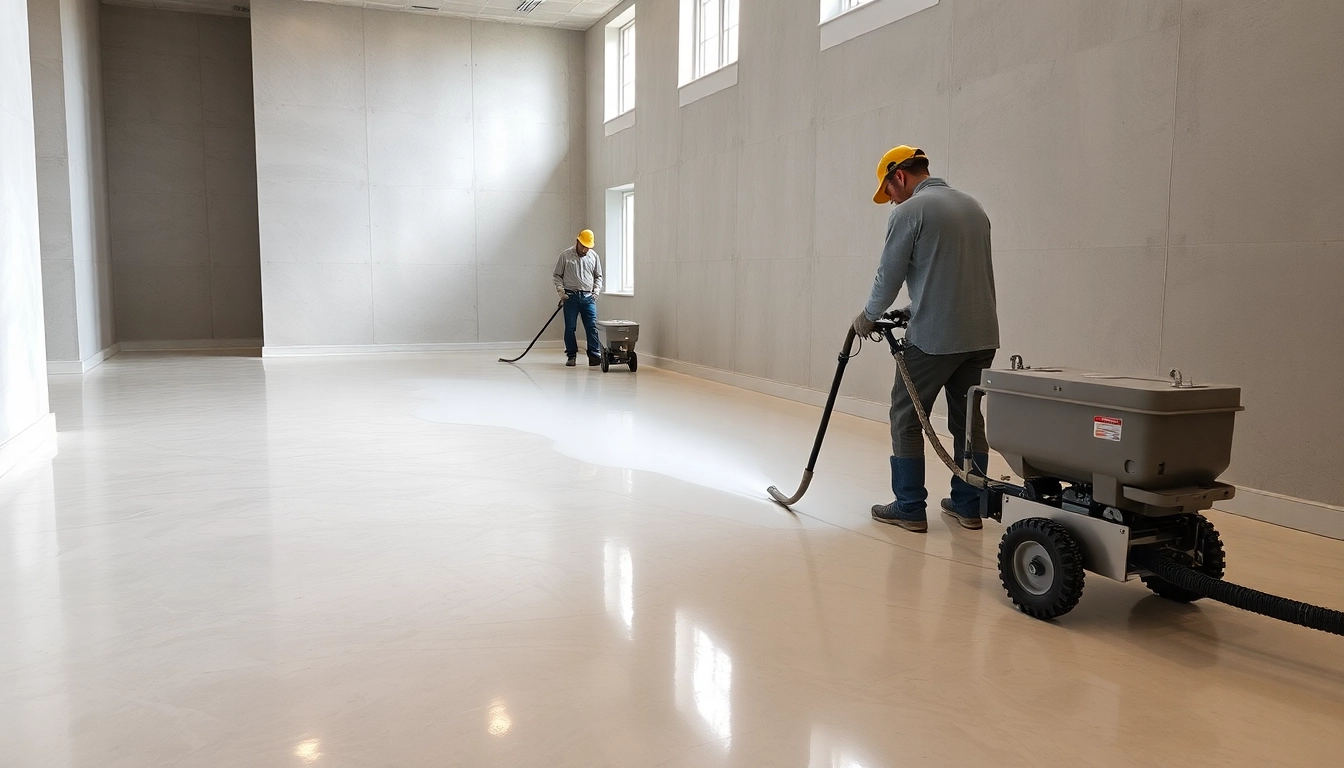Understanding Liquid Screeding in Birmingham: Benefits and Applications
In the modern construction and renovation industry, achieving a perfectly level and durable floor surface is crucial for both aesthetic appeal and functional performance. Among the innovative solutions available, liquid screeding has gained significant popularity, especially in cities like Birmingham, where property development and refurbishment are ongoing at a rapid pace. When considering floor solutions, a key factor to assess is the quality and expertise of your chosen contractor — to ensure optimal results, it’s vital to understand Liquid screeding Birmingham and how this technology can transform your building projects.
What is Liquid Screeding and How Does It Work?
Liquid screeding is a high-performance, free-flowing mixture typically composed of cement, fine aggregates, water, and additives that improve flowability and setting characteristics. Unlike traditional sand and cement screeds, which require manual spreading and screeding, liquid screeds are pumped into place using specialized equipment. This process ensures a seamless, self-levelling floor surface, accelerating installation times and resulting in a highly uniform finish.
Once poured, the liquid screed spreads naturally to fill every crevice, creating an even surface that requires minimal manual finishing. The use of pumpable, flowable mixtures allows for precise application over complex floor layouts, including underfloor heating systems, making it ideal for both residential and commercial projects across Birmingham.
Advantages of Using Liquid Screeding for Your Property
Opting for liquid screeding offers numerous benefits, making it a preferred choice among builders, contractors, and homeowners in Birmingham:
- Fast Installation: The pumping process significantly reduces installation time, allowing projects to be completed quicker compared to traditional methods.
- High Precision and Levelness: Thanks to its self-levelling properties, liquid screed results in a perfectly flat surface, essential for laying flooring materials like tiles, wood, or carpet.
- Enhanced Underfloor Heating Efficiency: The excellent thermal conductivity of liquid screed improves heat distribution, making it an optimal base for underfloor heating systems.
- Reduced Material Waste: Pumped application minimizes waste and mess, contributing to cost savings and cleaner work environments.
- Versatility: Suitable for various substrates and adaptable to different building types, from new builds to refurbishments in Birmingham.
- Long-Term Durability: Properly installed liquid screed provides a hard-wearing surface that withstands foot traffic and environmental changes over years.
Common Applications of Liquid Screeding in Birmingham Projects
Given Birmingham’s diverse building landscape, liquid screeding is utilized across a variety of projects, including:
- Residential Developments: Providing robust foundations for underfloor heating and smooth flooring surfaces in new homes and refurbishments.
- Commercial Spaces: Retail outlets, offices, and industrial facilities benefit from rapid installation and durable finishings enabled by liquid screed.
- Public Infrastructure: Hospitals, schools, and community centres use liquid screeding for seamless, long-lasting floors that meet stringent safety standards.
- Renovation Projects: Upgrading existing floors with minimal disruption, particularly where underfloor heating or level changes are required.
Choosing the Right Liquid Screeding Contractor in Birmingham
Key Factors to Consider When Selecting a Service Provider
Selecting a qualified contractor is critical to ensure that your project meets the highest standards of quality and safety. Important considerations include:
- Experience and Local Knowledge: Preferably, choose a contractor with extensive experience in Birmingham’s construction environment and familiarity with local building regulations.
- Certification and Qualifications: Verify industry certifications, such as CSP (Certified Screeding Professional), and adherence to BS standards for screeding and flooring.
- Portfolio of Past Projects: Review case studies or ask for references, particularly projects similar in scope and size to your own.
- Use of Quality Materials and Equipment: Ensure the contractor employs modern pump systems and high-grade screed mixes for optimal results.
- Customer Service and Support: A reliable contractor should provide transparent communication, clear timelines, and post-installation advice.
Questions to Ask Your Screeding Contractor
Effective questioning can help you gauge expertise and service quality. Consider asking:
- What types of liquid screed do you use, and how do you choose the right mix for my project?
- Can you provide references or testimonials from previous clients in Birmingham?
- What is your typical project timeline, and how do you handle unexpected delays?
- How do you ensure the curing process is optimal for long-term performance?
- What measures do you take to protect the finished surface during subsequent construction phases?
How to Verify Experience and Certification
To confirm a contractor’s credibility, ask for tangible proof such as:
- Certificates from recognized industry bodies or accreditation programs.
- Detailed project portfolios with photographs and client feedback.
- Evidence of trained and certified personnel operating specialized pumping equipment.
- Insurance coverage and compliance with health and safety regulations in Birmingham.
Step-by-Step Process of Liquid Screeding Installation
Preparation and Surface Assessment
The installation process begins with a thorough assessment of the subfloor. Ensuring the surface is clean, level, and free from contaminants like oil or loose debris is essential. Any cracks or structural issues should be addressed beforehand. Proper preparation guarantees excellent bonding and a consistent finish.
Mixing and Pumping Techniques
Next, the liquid screed is mixed with water and additives to achieve the desired flowability. Modern batching plants produce high-quality mixes, which are then transported to the site. Pumping involves a high-pressure hose system that delivers the liquid evenly across the floor. Skilled operators control the flow rate and temperature, ensuring a homogeneous mixture and smooth application.
Finishing and Curing Procedures
Once poured, the screed naturally levels itself, eliminating the need for manual screeding. To ensure optimal curing, it’s recommended to shield the surface from rapid drying caused by sun or drafts. Applying curing compounds or covering with damp mats can enhance strength development. Typically, curing lasts for at least 7 days, during which the floor remains protected from heavy traffic until fully hardened.
Best Practices for Maintaining and Long-Term Performance of Liquid Screed Floors
Regular Inspection and Maintenance Tips
To prolong your floor’s lifespan, conduct periodic inspections for cracks, chips, or signs of wear. Maintaining consistent cleaning routines and using appropriate floor coverings can minimize damage. For floors with underfloor heating, ensure temperature settings are within recommended limits to prevent thermal stress.
Common Issues and Troubleshooting
Despite high-quality installation, issues such as cracking or surface delamination can occur. These are often caused by improper curing, substrate movement, or material deficiencies. Addressing problems early by consulting with your contractor prevents long-term damage and costly repairs.
Enhancing Floor Durability with Proper Care
Applying suitable protective coatings or sealants can improve resistance to stains and mechanical impact. Maintaining appropriate humidity levels and avoiding heavy equipment directly on the surface during curing also contribute to durability.
Performance Metrics and Cost Considerations for Liquid Screeding Projects in Birmingham
Measuring the Success of Your Screed Application
Success metrics include achieving the desired levelness within tight tolerances, curing without cracks or surface defects, and ensuring compatibility with subsequent flooring layers. Regular testing, such as laser levelling and moisture assessments, helps verify quality standards.
Budgeting and Cost Breakdown for Liquid Screeding
Costs fluctuate based on project size, complexity, and location. Typically, the price per square metre for liquid screed in Birmingham ranges from £15 to £25, inclusive of materials and labor. Factors influencing costs include substrate preparation, underfloor heating integration, and finishing requirements. Engaging a local, experienced contractor ensures value for money and adherence to budget constraints.
Case Studies: Successful Projects in Birmingham
Successful examples include residential developments in Sutton Coldfield where liquid screed enabled rapid installation of underfloor heating systems, improving energy efficiency and comfort. Commercial refurbishments in Birmingham city centre utilized liquid screeding for quick turnaround, minimal disruption, and durable finishes. These projects highlight how tailored solutions and professional installation elevate building performance and user satisfaction.


